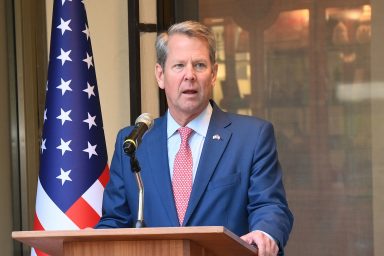States are testing the limits of the Supreme Court's controversial Citizens United ruling with laws banning foreign-owned corporations from donating to super PACs.

Spending in US elections is at record levels since the Supreme Court’s Citizens United decision unleashed a corporate cash deluge. In 2016, political advertisements paid for in Russian rubles sought to sow discord in the US and help Donald Trump win the presidency. Yet Congress and an intentionally dysfunctional Federal Election Commission (FEC) are doing nothing to fix a broken system.
Now states across the country are seeking to fill that void by looking for ways to whittle away at the controversial 2010 Supreme Court ruling that opened the floodgates for corporate money in elections.
US corporations and independent groups poured $4.5 billion into the coffers of politicians and parties over the past decade, according to a report by the Center for Responsive Politics. In addition, foreign-influenced corporations “secretly funnel[ed] money to elections through nonprofits and shell companies.”
Now, campaign finance reform advocates are leading a drive to test the limits of the Citizens United ruling, in an effort to close some of the loopholes it left.
Nonresident foreign nationals are already prohibited from donating to political campaigns or political action committees (PACs), but Citizens United gave foreign-owned corporations the ability to circumvent that law. Two states — New York and Maryland — want to explicitly ban these corporations from donating to political campaigns at the state and local level; such contributions to PACs would be prohibited in any election.
“Unlimited corporate expenditures have a pernicious effect on our elections and the Democracy Preservation Act will make substantial inroads in fighting the influence of big corporations.”
The proposed legislation in New York, the Democracy Preservation Act, was recently introduced by Senate Deputy Leader Michael Gianaris (D). It would prohibit donations from corporations of which one foreign national owns more than 1 percent or more than 5 percent are owned by foreign nationals cumulatively.
“Unlimited corporate expenditures have a pernicious effect on our elections and the Democracy Preservation Act will make substantial inroads in fighting the influence of big corporations,” Gianaris told WhoWhatWhy. “Enactment of this bill would ensure that New York’s elections are decided by its people, not by big corporations.”
Prior to Citizens United, election law generally allowed foreign-owned companies, like Toyota, to have a PAC and make political expenditures, so long as the PAC met two requirements: the money for the PAC had to come from Americans, and the decisions of this PAC had to be managed and directed by Americans.
But Citizens United led to the creation of super PACs — which are not required to disclose their donors — creating a loophole for foreign entities to influence US elections.
“The problem is, of course, that we live in a world now where there are multinationals, where there are many different vehicles for expenditures to come from,” Meredith McGehee, executive director for the campaign finance reform group Issue One, told WhoWhatWhy. “But where it gets really messy is — what actually is a foreign-owned company in the world of multinationals?”
x
Watchdog Group Sues to Reveal Dark Money Donor List After Feds Won’t
Maryland’s state legislature is considering a ban that would make clear whether a multinational corporation can donate to a super PAC, and held a hearing last week on a bill led by State Sen. Clarence Lam (D). The bill bans foreign-owned corporations from donating to PACs or funding independent expenditures like advertisements. And any corporation that makes an independent expenditure during an election must certify that it has no foreign ownership.
Free Speech for the People, a nonprofit organization founded the day of the 2010 ruling, has advocated throughout the country for these bans.
“With this bill, Maryland lawmakers have the opportunity to close a legal loophole that has left Maryland elections vulnerable to foreign interference through corporate political spending,” Courtney Hostetler, counsel for Free Speech for the People, said.
Florida’s St. Petersburg City Council was the first jurisdiction in 2017 to ban foreign-owned corporations from donating to campaigns. The City Council also placed limits on how much corporations can donate to PACs, effectively stopping super PACs from spending in the city’s local elections.
The Seattle City Council followed St. Petersburg’s path this year, passing a ban on corporations with at least 5 percent foreign ownership from donating to political campaigns in local elections. This was widely seen as an effort to combat influence from the online retailer Amazon, which has a 9 percent foreign ownership. Seattle’s legislation had the backing of FEC commissioner Ellen Weintraub.
Citizens United drew a map for foreign-owned corporations to circumvent the limits of campaign finance laws, McGehee explained, adding that foreign interference in the 2016 election “certainly turbocharged the effort” to stop these corporations from evading laws that prohibit foreign interference in US elections.
Related front page panorama photo credit: Adapted by WhoWhatWhy from Clker-Free-Vector-Images / Pixabay.



